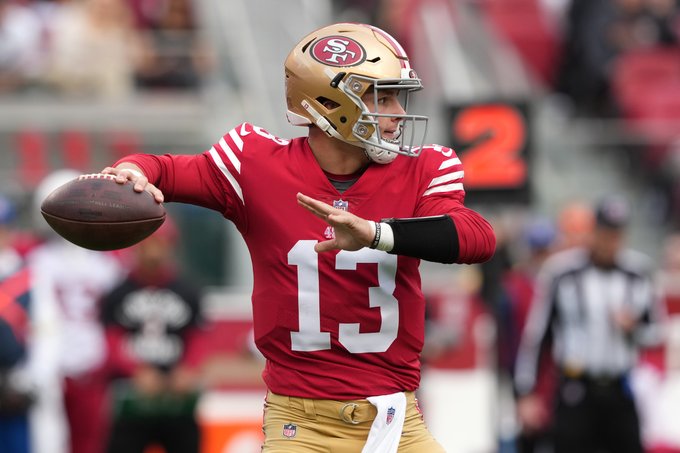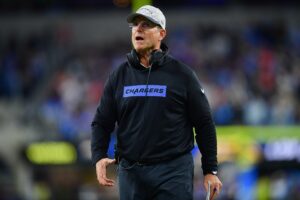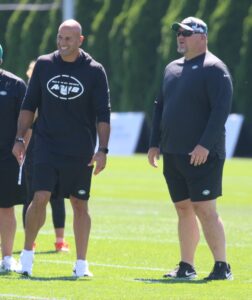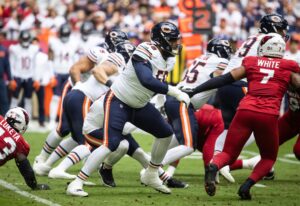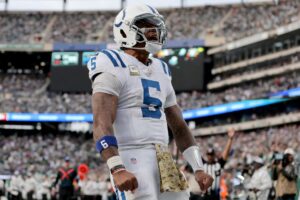The Mythological American Hero that is the franchise quarterback is an unchallenged truism of the sports landscape. More than any other position in sports, the quarterback is considered the one “must-have” position. In baseball, teams can go with small ball, big hitters, pitching heavy, bullpen reliant. With hockey too, some teams focus on big defensemen, some look for speed, some focus on goaltending first and build from there. In basketball, teams focus on getting a superstar, but the position rarely matters. Yet, year after year, NFL teams lift up quarterbacks to the top pick with varied success. I propose a new strategy that some teams are, perhaps unwittingly, trying: quarterback Last.
Time for a “Quarterback Last” Era
There are Quarterbacks Available in Every Round
More than half the 2022-23 playoff teams do have quarterbacks drafted in the first round. Seven of those players were drafted in the top ten, only three in the top five. Yet, four of the regular starters on these teams were selected in the fourth round or later: Tom Brady, Brock Purdy, Dak Prescott, and Kirk Cousins.
The #49ers end the regular season on a 10-game winning streak, including the last six with Brock Purdy.
Purdy: 114/170 (67%), 1,374 passing yards, 13 passing TDs, 1 rushing TD, 4 INTs.
San Francisco scored 33+ points in 5 out of those 6 games. Purdy threw 2+ TDs in each game. pic.twitter.com/DjzzIB7f2w
— Ari Meirov (@MySportsUpdate) January 8, 2023
There is more evidence of the error of QB Wins if we look at a greater scope. Since the start of the 2000 season, thirteen quarterbacks have led the 22 Super Bowl Champions. Of those thirteen quarterbacks, just five were top-ten picks. These quarterbacks were Peyton Manning, Eli Manning, Trent Dilfer, Patrick Mahomes, and Matthew Stafford. Oddly enough, three of the seven Super Bowls these quarterbacks won were with a different team. Another four were selected third round or later (Tom Brady, Russell Wilson, Nick Foles, Brad Johnson).
Many Star Quarterbacks Were Contingency Plans
Many of the recent successful quarterbacks were backup plans. Aaron Rodgers was selected by a Green Bay Packers team that still had Brett Favre. Tom Brady was selected by a New England Patriots team that still had Drew Bledsoe. Russell Wilson was selected by a Seattle Seahawks team that had just gone after Matt Flynn. Even Brett Favre joined a Packers team with a Pro Bowl quarterback in Don Majkowksi. These men walked into situations.
Brett Favre walked into a Packers team that had not been successful in decades. That is very true. Still, when he became the starter, he was throwing to Sterling Sharpe and Robert Brooks. He also had decent tight ends in Jackie Harris and Ed West (not stars, but very good). Edgar Bennett, Vince Workman, and Darrell Thompson were in the backfield. He had a defense with a solid linebacking corps (Johnny Holland, Tony Bennett, Bryce Paup, Brian Noble, George Koonce). The defense also boasted two Pro Bowl Safeties, LeRoy Butler and Chuck Cecil.
Aaron Rodgers had to wait his time behind Favre, but when he got his chance, the cupboard was full. In Rodgers’ first year as a starter, his receiving corps included Greg Jennings, Donald Driver, James Jones, Jordy Nelson, and Ruvell Martin. Ryan Gran and Brandon Jackson shared the backfield with Rodgers. Rodgers also enjoyed having a defense that featured Charles Woodson, Nick Collins, Tramon Williams, Aaron Kampman, Nick Barnett, and A.J. Hawk.
Russell Wilson came in to be the backup to Matt Flynn but beat him out in training camp. In his first season, he handed the ball off to Marshawn Lynch. Lynch had 1,590 yards rushing that year. Wilson also benefitted from throwing to Sydney Rice, Golden Tate, and Doug Baldwin in that very first season. Add in the fact that the Legion of Boom was just starting off at the same time. Wilson was able to play without concern that he needed to outscore many opponents.
The Brady-Couch Contrast
Tom Brady is the most accomplished quarterback in history. He has been on the most championship-winning teams. Still, he was able to walk into a good situation. Tom Brady walked into a team that featured Drew Bledsoe. Bledsoe had led the Patriots to a Super Bowl appearance following the 1996 season. Five years later, Bledsoe was injured and Brady had to step in.
The Patriots wide receivers included Troy Brown, David Patten, and Terry Glenn. Brown had 101 receptions for 1,199 yards that year. Kevin Faulk and Antowain Smith carried the ball. The linebacker corps was an embarrassment of riches. The 2001 team featured Tedy Bruschi, Willi McGinest, Larry Izzo, Mike Vrabel, Bryan Ox, Roman Phifer, and Ted Johnson. The defensive backfield included Lawyer Milloy and Ty Law. The Patriots threw for 3,181 yards in 2000, then dipped slightly to 3,089 yards in 2001 with Brady stepping in.
Tim Couch presents an important contrast. The Browns selected Tim Couch as the first-overall pick in 1999, just a year before Tom Brady was selected in the sixth round. Couch went to an expansion team. In 1999, the Browns running backs were Terry Kirby and Karim Abdul-Jabbar. Tim Couch’s top receivers were Kevin Johnson, Darrin Chiaverini and Leslie Shepherd.
He also had no major defensive help. The starting linebackers were Wali Rainer, Jamir Miller, and Rahim Abdullah. The cornerbacks were Ryan McNeil and Daylon McCutcheon. Couch spent a lot of time playing from behind and throwing to players who were going to be out of the league in a few years. Tim Couch started his very first year and threw for 2,447 yards, 15 touchdowns, and 13 interceptions. Brady threw for 2,843 yards with 18 touchdowns and 12 interceptions. Both players played in 15 games with 14 starts. One of these seasons was good enough to win a Super Bowl and the other led to a 2-12 record. The difference in supporting cast matters.
Wait For Your Quarterback
There is no reason to rush and get an early-pick quarterback when you do not have the supporting cast to make them worthwhile. Instead of drafting Tim Couch, the Browns could have started off with Torry Holt, Edgerrin James, or Champ Bailey. Aaron Brooks was still there in the fourth round.
This sort of situation happens over and over. The Chicago Bears gave up draft capital to move up for Mitchell Trubisky. While it is famous now that they passed on Patrick Mahomes, they could have sat for C.J. Beathard or waited a year for someone like Baker Mayfield, Josh Allen, or Lamar Jackson. The Bears traded away the 67th overall pick in that 2017 draft, a pick that turned out to be Alvin Kamara. The Bears needed a lot and they made sure their young quarterback did not have that support and would not get it soon.
It is entirely possible that Patrick Mahomes would have had a harder time being the player we enjoy if he had been taken by the Bears. The Kansas City Chiefs had the 27th pick in the 2017 draft and moved up even though they had Alex Smith and an offense that ranked 4th in DVOA. In 2017, Mahomes sat and the Chiefs went 10-6. Alex Smith threw for over 4,000 yards with a 104.7 rating. Travis Kelce, Tyreek Hill, and Kareem Hunt were all key players on this team. Going to the Bears would have drastically changed Mahomes’ ability to showcase his skills.
“Quarterback Last” is Accidentally Working
The main point here is the quarterback position is perhaps the most overvalued position in all sports. Teams should build up a team that is a quarterback away from competing and then find someone. Additionally, drafting early quarterbacks sometimes hinders teams. Matthew Stafford has been a very good quarterback for years. He was good enough for the Detroit Lions to pay him as an elite player, but not good enough to carry the team without massive support.
He went to the Los Angeles Rams, a team that had been building to adding a star quarterback. The Rams took a shot as a team getting old and fighting the edges of the salary cap, but it worked for one year. The Lions turned Stafford into a team with more receivers and greater speed. A team with more agility in free agency. Also, a team with a “good enough” quarterback to make the team a winning team in 2022.
The quarterback hero is a myth and Americans love our myths. We count team wins as QB Wins. Fans should demand our teams keep increasing quarterback pay for our heroes. We want General Managers fired for not jumping up to get that franchise quarterback. What we should demand is that teams build a team to a point where they draft the quarterback last. This will only happen once fan bases are understanding this because it will take time. Still, it is just about the only way that has actually worked over the last 20 years.


